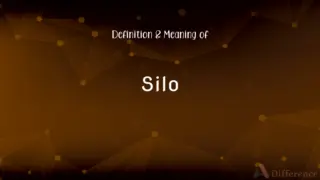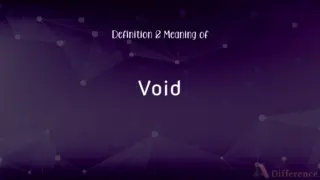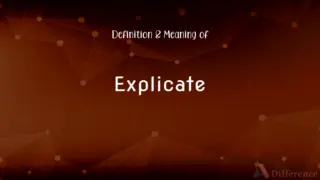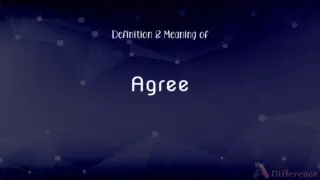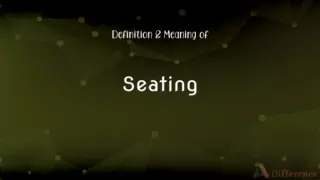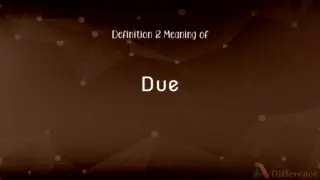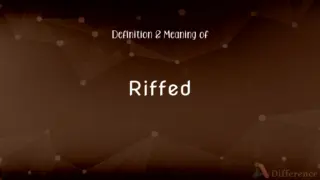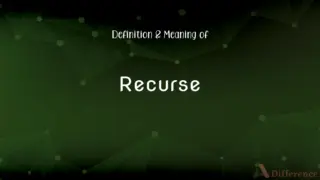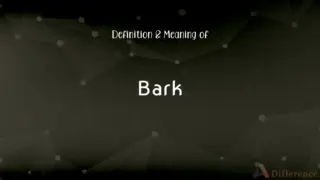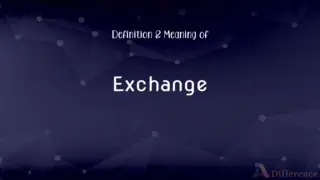Poem Definition and Meaning
By Tayyaba Rehman & Maham Liaqat — Updated on March 5, 2024
A poem is a piece of writing that expresses emotions, experiences, or ideas in a stylized and often rhythmic form. e.g., She recited a beautiful poem about nature.

Table of Contents
Poem Definitions
A piece of creative writing that uses techniques such as metaphor, simile, and symbolism.
The poem painted a vivid picture of the sunset.
A form of literature that allows for the expression of personal or collective experience.
The national poem celebrated the country's history and culture.
A written or spoken work that is intended to evoke an emotional response through its language.
The poem about friendship brought tears to everyone's eyes.
An artistic form of auditory communication incorporating phonetic qualities, pausing, and emphasis.
The poet's recitation of her poem mesmerized the audience.
A structured collection of lines that may follow a specific rhythmic pattern.
The poem had four stanzas, each with its own rhyme scheme.
A composition in verse, often characterized by its use of imagery and meter.
The child wrote a short poem for her mother.
Literary work that expresses feelings and ideas with a distinctive style and rhythm.
His poem on loneliness won the school competition.
A succinct expression of complex thoughts or feelings in a compact form.
His haiku, a form of Japanese poem, captured the essence of winter.
Any written work that uses conciseness and musicality to convey a message.
The teacher encouraged students to express themselves through a poem.
A piece that often explores philosophical, spiritual, or profound ideas.
The poem delved into the themes of existence and identity.
A verbal composition designed to convey experiences, ideas, or emotions in a vivid and imaginative way, characterized by the use of language chosen for its sound and suggestive power and by the use of literary techniques such as meter, metaphor, and rhyme.
A composition in verse rather than in prose
Wrote both prose and poems.
A literary composition written with an intensity or beauty of language more characteristic of poetry than of prose.
A literary piece written in verse.
A piece of writing in the tradition of poetry, an instance of poetry.
A piece of poetic writing, that is with an intensity or depth of expression or inspiration greater than is usual in prose.
A metrical composition; a composition in verse written in certain measures, whether in blank verse or in rhyme, and characterized by imagination and poetic diction; - contradistinguished from prose; as, the poems of Homer or of Milton.
A composition, not in verse, of which the language is highly imaginative or impassioned; as, a prose poem; the poems of Ossian.
A composition written in metrical feet forming rhythmical lines
Poem Snonyms
Ballad
A poem or song narrating a story in short stanzas.
The ancient ballad told tales of heroes and their deeds.
Haiku
A Japanese form of poetry consisting of three lines with a 5-7-5 syllable pattern.
His haiku captured the essence of nature in just a few words.
Verse
A single line of poetry.
She recited a beautiful verse from her favorite poem.
Limerick
A humorous five-line poem with a distinct rhythm and rhyme scheme.
He amused the crowd with a lighthearted limerick about a man from Kent.
Narrative
A poem that tells a story and has a plot.
The narrative poem detailed the adventure of its characters with engaging rhythm.
Elegy
A poem of serious reflection, typically a lament for the dead.
The elegy moved everyone with its heartfelt sorrow and longing.
Sonnet
A poem of fourteen lines using any of a number of formal rhyme schemes.
Shakespeare's sonnet 18 is among the most famous poems.
Ode
A type of lyrical stanza, often expressing praise or a strong emotion.
The poet wrote an ode to celebrate the beauty of the ocean.
Lyric
A short poem expressing personal feelings and emotions.
Her latest lyric poignantly captures the pain of lost love.
Epic
A long narrative poem, often written about a hero or heroic deeds.
Homer's Odyssey is an epic that has survived through centuries.
Poem Idioms & Phrases
Write someone a poem
To do something very special and thoughtful for someone, akin to writing them a personalized poem.
For her birthday, he decided to write her a poem, expressing his feelings.
A poem on the lips
When someone is about to say something beautiful or profound, as if they are reciting poetry.
With a poem on the lips, he confessed his love under the starlit sky.
A poem in motion
Describing something or someone whose actions are so graceful or expressive that they resemble the flow of poetry.
The dancer was a poem in motion, captivating the audience with her movements.
Every heart sings a poem, incomplete, until another heart whispers back
Highlighting the idea of companionship and understanding between people as essential for a fulfilling life.
When they met, it felt like every heart sings a poem, incomplete, until another heart whispers back, and they knew they were meant to be.
A poem in every flower
Each flower carries within it a story or emotion that could inspire a poem.
The gardener saw a poem in every flower, marveling at their silent stories.
To live is not just to exist, but to exist is to write a poem
Suggesting that truly living life involves creating something beautiful or meaningful, similar to writing a poem.
He quit his corporate job to pursue art, believing that to live is not just to exist, but to exist is to write a poem.
Every day writes a poem
The belief that each day brings new experiences and emotions worth capturing in poetry.
He kept a diary, convinced that every day writes a poem in the story of his life.
A picture is a poem without words
Suggesting that visual art can express complex emotions and ideas just like a poem does, but without using words.
The artist's gallery was filled with paintings, each a picture is a poem without words.
Life is a poem
Meaning life is full of beauty and emotion that can be captured in the essence of a poem.
Walking through the serene forest, he realized life is a poem, full of wonders.
The world is a poem on a grand scale
Indicating that the world and nature are full of beauty and inspiration like a grand poem.
Standing atop the mountain, he felt the world is a poem on a grand scale.
Reading life like a poem
Approaching life with depth and sensitivity, finding meaning in every experience.
She traveled the world, reading life like a poem, savoring its every nuance.
A silent poem
An action or gesture that conveys deep feelings or meanings without words.
Their embrace was a silent poem, communicating everything they felt.
Building dreams like poems
Carefully crafting one's dreams with the creativity and passion one puts into writing poems.
She approached her goals with the heart of a poet, building dreams like poems.
Turning pain into poems
The process of using one's suffering and experiences as inspiration for creating poetry.
After her loss, she began turning pain into poems, finding solace in the verses.
To find a poem in the ordinary
Discovering beauty and inspiration in everyday moments and things.
As a poet, he had the gift to find a poem in the ordinary, from the hum of the city to the quiet of the countryside.
Poems in the eyes
When someone's eyes reveal their deep emotions or stories, as if their gaze itself were poetry.
They said she had poems in her eyes, a depth that words could hardly capture.
A poem unspoken
A feeling, idea, or thought that is deeply felt but not yet expressed in words.
Between them was a poem unspoken, a mutual understanding that needed no words to be felt.
The universe is a poem written in the language of mathematics
This phrase suggests that the universe's complexity and beauty can be understood or described through mathematics, much like poetry uses language to convey emotions and ideas.
As he studied the stars, he marveled at how the universe is a poem written in the language of mathematics.
Nature's poem
The natural world around us, seen as a beautifully written poem by the earth.
The breathtaking sunrise over the mountains was nature's poem, a testament to the world's beauty.
Poem Example Sentences
Every morning, she writes a new poem to start her day.
He found solace in reading a poem by his favorite author.
The poetry book was filled with poems about love and loss.
Students were asked to memorize a poem for English class.
She gifted him a poem written on a scroll for their anniversary.
The library held a contest for the best original poem.
At the coffee shop, a local artist performed her spoken word poem.
The magazine published a poem that spoke about social injustice.
The poem's rhythm matched the beat of the rain against the window.
In class, they analyzed the metaphor used in the poem.
The poem described the beauty of the desert at dawn.
They found an old poem hidden in the attic among the letters.
The festival celebrated poetry with readings of poems from around the world.
For homework, they had to write a poem using personification.
The poem used nature as a metaphor for human emotions.
Common Curiosities
How do we divide poem into syllables?
We divide "poem" into syllables as "po-em."
What is a stressed syllable in poem?
The first syllable "po" is the stressed syllable in "poem."
How many syllables are in poem?
There are two syllables in "poem."
How is poem used in a sentence?
The teacher asked each student to write a poem about their summer vacation.
Why is it called poem?
A poem is called so due to its Greek origin from the word "poema," meaning "thing made or created," reflecting its nature as a crafted piece of writing.
What is the pronunciation of poem?
Poem is pronounced as /ˈpoʊ.əm/.
What is another term for poem?
Another term for "poem" is "verse."
Is poem a noun or adjective?
"Poem" is a noun.
What is the verb form of poem?
There isn't a direct verb form of "poem," but "poetize" or "compose" can be used as verbs related to the creation of poetry.
Is poem an adverb?
No, "poem" is not an adverb.
Which vowel is used before poem?
The article "a" is used before "poem" when it precedes a consonant sound; "an" is used if mistakenly considering the silent "p" rule, but traditionally, "a poem" is correct due to the pronounced "p" sound.
What is the root word of poem?
The root word of "poem" is the Greek "poema," meaning "thing made or created."
Is poem an abstract noun?
Yes, "poem" is an abstract noun as it represents an idea or concept rather than a physical object.
Is the word poem imperative?
No, "poem" is not imperative as it is not a verb form giving a command.
What is the opposite of poem?
There isn't a direct opposite of "poem," but "prose" is a different form of writing not composed in verse.
Is poem a negative or positive word?
"Poem" is neutral; its connotation depends on the context in which it is used.
Is poem a vowel or consonant?
The word "poem" starts with a vowel sound.
Is the word poem Gerund?
No, "poem" is not a gerund; it is a noun.
Which conjunction is used with poem?
Conjunctions like "and," "or," and "but" can be used with "poem" to connect it to other ideas or objects in a sentence.
What is the singular form of poem?
The singular form is "poem."
What is the plural form of poem?
The plural form is "poems."
Is poem a countable noun?
Yes, "poem" is a countable noun.
Is the poem term a metaphor?
The term "poem" itself is not a metaphor, but poems often use metaphors.
Is the word “poem” a Direct object or an Indirect object?
"Poem" can be used as a direct object in a sentence, e.g., "She wrote a poem."
Which determiner is used with poem?
Determiners like "a," "the," "my," or "this" can be used with "poem."
What part of speech is poem?
"Poem" is a noun.
Is poem a collective noun?
No, "poem" is not typically used as a collective noun.
Which preposition is used with poem?
Prepositions such as "about," "in," or "for" can be used with "poem," depending on the context.
Which article is used with poem?
The indefinite article "a" is typically used with "poem."
Share Your Discovery
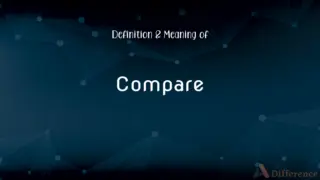
Previous Term
Compare Definition and Meaning
Next Term
Fix Definition and MeaningAuthor Spotlight
Written by
Tayyaba RehmanTayyaba Rehman is a distinguished writer, currently serving as a primary contributor to askdifference.com. As a researcher in semantics and etymology, Tayyaba's passion for the complexity of languages and their distinctions has found a perfect home on the platform. Tayyaba delves into the intricacies of language, distinguishing between commonly confused words and phrases, thereby providing clarity for readers worldwide.
Co-written by
Maham Liaqat








